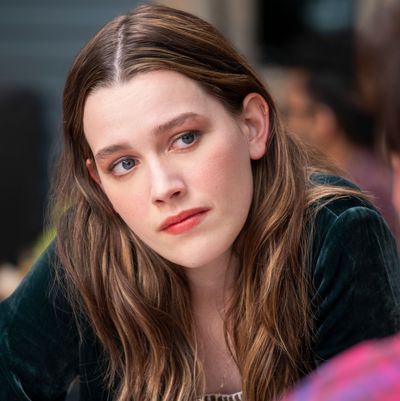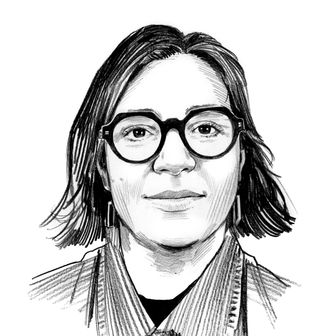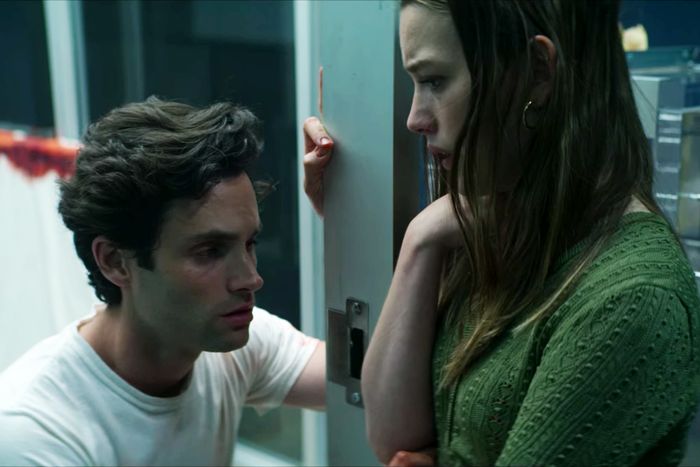
Major spoilers ahead for You season one and season two.
By the end of the first season of You, Netflix’s demented stalker romance, the unfortunate object of Joe’s affection, Beck (Elizabeth Lail), finally realizes too late that her dreamy bookish boyfriend is actually a serial killer. In the second season, Joe (Penn Badgley) flees to the West Coast and falls in love with a new woman named Love (Victoria Pedretti), a beautiful, carefree L.A. girl who bakes exquisite baked goods and is supported by her bougie family. But Love is hardly the sweet and quirky object of affection that she seems to be. “We’re not actually a show that trucks in manic pixie dream girls,” Sera Gamble, You’s showrunner, says.
What the show does truck in is steely people who are capable of murder if they think it will get them what they want — and Love turns out to be a killer just like Joe. In the season-two finale, Love reveals that not only is she a murderer, but that she killed Joe’s neighbor to protect him. Even after her own brother, Forty (James Scully), confronts Joe about his dark past, she doesn’t budge from the man of her dreams. Naturally, You being You, Love and Joe end the season married with a baby on the way. (Relationships have been built on less.) Below, Gamble tells us about how the writers’ room developed Love’s character and shaped her surprising arc, why they abandoned a story line where Love killed Forty, and where she’d like to take the show if it’s renewed for a third season.
The seed for Love’s character really started in Hidden Bodies, the second Joe Goldberg book by Caroline Kepnes. In the book, when Love finds out about everything that Joe has done, she locks him in a bathroom and he’s pretty sure that’s the end of the road for him, but then she surprises him by being more understanding than he expected. We took that to a much crazier place. In our version, Love is more than understanding of Joe’s murders — she turns out to be a killer herself.
We always knew where we were ending. When you first walk into your office on day one of a show and it’s a thousand blank cork boards staring at you, waiting to be filled with stories, you gotta give yourself something to hold on to. So the first thing we did before we started talking about any individual episode, is say, “Where are we starting and where are we ending?” We always knew we were gonna reveal a little bit about who Love really is, and by the end of the season she would be pregnant with Joe’s child. We worked backward from there.
Coming up with her character and arc over the season was a slow process. We tried all these different combinations to see which flavors worked together. We really liked the idea that she was much more like Joe than he could ever have suspected — that in a certain kind of dark way, he really did get his perfect match. She just matches a lot of parts of him that he doesn’t want to see. We wanted to walk Joe right up to the hairy edge of truly looking himself in the eye. So everything about his relationship with Love really sprang from that mission. How Joe feels about Love says everything about how he feels about what he really does. When you see him feel repulsed by Love, as he works his way through the spectrum of emotion in the final episode, that’s him unable to see that they’re pretty much the same. That horror he feels is really about how he is unable to stare down the truth of everything he’s done — that if he did really see himself, he would be repulsed.
A huge point of season two is that Love is very different from Beck. If you take away all the murder for a minute, and you just look at the relationship structure, season one was about that passionate, love-at-first-sight kind of relationship that’s fraught with conflict. When he meets Love, Joe is in a place of heartbreak. Part of what draws Love to Joe is that she senses that he’s experienced deep loss, as has she. It is the kind of relationship that is born out of shared loss. I remember my first really keen experience with grief; I felt like I had this X-ray vision and I was suddenly seeing how much of people’s behavior was informed by their grief. That’s something that we tried to capture early in the season, when Love cooks for Joe and she tells him that she can see that in people. Of course, we play those beats sincerely, but there’s also a tongue-in-cheek vibe happening because Joe caused all of his own misery, obviously, and you find out eventually that Love caused a certain amount of her own misery as well.
We knew we were working toward a realization that Love wasn’t too terribly different from Joe, but it took us a while to figure out who, exactly, she was going to kill and why she’d kill them. We’re not really a show that’s interested in cold-blooded, psychopathic killers who derive pleasure from violence. Our job in season one was to construct Joe so that you really understood that he had a moral code in his life, and that he was never killing just to kill. When he killed, he believed that was what he had to do to be a good man — what he had to do for love, with a lowercase l. So it made sense to us, in building Love, that we would begin with a forensic investigation of her early life, her family, and the people that we would meet over the course of the season: her mom, her dad, and especially her twin brother. And then we asked ourselves, What would be, at least in her own mind, very justified reasons for doing violence?
This approach really fit with a broader idea that she is self-possessed and confident. She has the kind of confidence that comes from her extreme privilege. She’s a free spirit, but she’s responsible. She was raised to understand that you protect family at all costs. Those characteristics could all be good things, but Love takes them far. The lines that you or I might not want to cross, she’s okay with crossing if she has to. All that said, we did at one point wonder whether the person Love murdered might be her own brother. We couldn’t make it work, though. Nobody could pitch a version that everybody really believed, because of how strong and deep that relationship was and how much of the season Love spends protecting him. But we certainly did try it.
Love’s character was definitely shaped by the fact that the new season is set in L.A. All the writers in the room live in L.A. and we all know women like Love. We’ve all spent time with her. There’s a vibe that’s particular to Los Angeles: There’s this wonderful confluence of self-realization, wellness, freedom, and just great fucking weather that makes a certain kind of very shiny, easygoing girl. But the facts of the case are the same whether you’re meeting someone in New York or L.A. or Paris or Seattle, which is that if you move through the world with a certain kind of privilege, protection, and confidence, then you’ll get some version of the Love character. Love needed to be a woman of privilege because women of privilege get away with more. Joe walks the world in the ultimate disguise: a nice bookish white guy. On the totem pole of privilege, a rich lady like Love is just a hair beneath that.
We always vet stories through Joe’s point of view, because we’re a stalker show and Joe is our stalker. But we tried to tell the story this season as though Love was the hero of the story, too. By the end of the season, she’s gotten everything she wanted. I don’t think she’s 100 percent happy about it. She also had the most tragic loss of her life. But all she’s ever really wanted was a family of her own. There’s a pure desire at the center of that. She’s just taken terrible steps to get there. And that mirrors Joe’s journey: I think if you tapped him on the shoulder in the moment before Beck walks into the bookstore in episode one, and you asked him to describe what his hopes and dreams are for a relationship, he would describe some version of the situation he’s in at the end of season two. Maybe it would in New York City, not the manicured lawns of Pasadena, but he deeply wants those things. He’s just got it very twisted about how you’re supposed to go about getting them. That’s the thing about the show: We start with fairly universal aspects of romantic love, we just take them in a really bloody, crazy direction. Murder is a metaphor for getting everything very, very wrong.
If we get a chance to tell more of this story, the big question will be, “What is between these two people now? Is it love? Is it hate? Is it a strange new emotion we need to find a name for?” At the end of the second book, Joe goes to jail — that’s the cliffhanger. A lot of people asked us, “Is Joe going to be in prison at the end of season two?” I always said yes because I think that’s where he is by the end of our season: Marriage, the whole suburbia of it all, that’s prison to him. And that provides us with this new avenue for a possible season three. What happens when you’re in a relationship where the commitments are not just about how your heart feels that day? Now it’s not so easy for Joe to just be like, Where’s the next girl? This one didn’t work out. Still, when Greg [Berlanti] and I were first pitching the show years and years ago, Greg said that every season would have a new love and also a new place. That’s been true so far, and we tried to make sure that we left season two promising the possibility of new love and also a very different place from the part of Los Angeles that we’ve been in so far.



